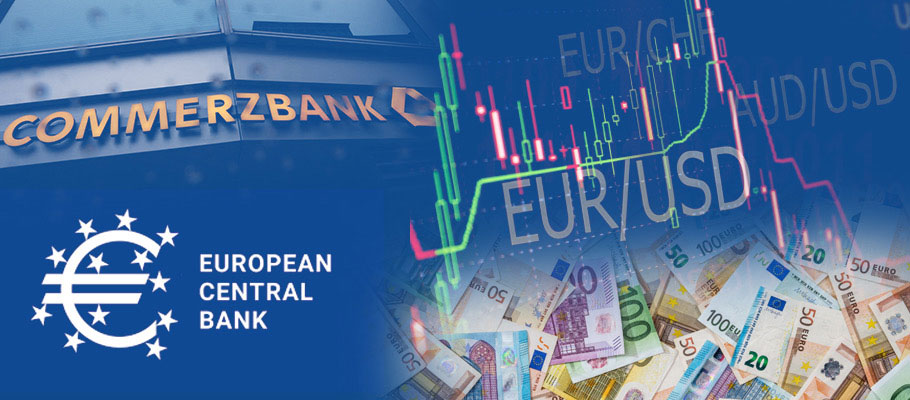
Published: July 9th, 2025
A market analysis from Germany's Commerzbank says there is little the European Central Bank (ECB) can do to halt the single currency's steady rise against USD, despite concerns expressed by Frankfurt over the EUR/USD exchange rate potentially rising above 1.20.
Recent statements by ECB policymakers have suggested Frankfurt might adjust its policies to prevent a material increase above the 1.20 level, which ECB Vice President Luis de Guindos described last week as a ‘pain threshold’ the bank is observing closely. However, Commerzbank thinks the bank is effectively helpless to do much about it.
‘How high the EUR/USD rate will go depends largely on the US and White House trade policy,’ wrote Commerzbank analysts. ‘Against a backdrop of USD weakness there is little Lagarde and de Guindos can do to influence this and prevent a rise above 1.20.’
That suggests the Euro could come under added selling pressure as it nears this level. Commerzbank notes that if the Euro's rapid rise against the Greenback was being caused by differences in monetary policy between Washington and Frankfurt, then the ECB might have scope to take action. In the current environment however the drivers are macroeconomic.
Unfortunately for the bloc's central bankers, the Euro's rise is the result of investor and institutional moves to de-risk and diversify away from American assets thanks to the uncertainties created by Trump White House trade policy.
In an environment where interest rates set the tone for currency trading, the ECB would have more scope to do something about the single currency's strength. For now, a stronger Euro that penalises European exporters is on the cards for the near term.
In June, the French government began diplomatic efforts to convince its fellow EU members to take additional measures designed to raise the Euro's appeal as a global reserve currency, a new front in Paris' ongoing effort to incentivize more joint borrowing by the bloc.
The most recent lobbying moves are happening while the US Dollar's status as the de facto global currency is being questioned, due in part to perceptions that the Trump White House is taking an erratic and insular approach to policy decisions.
A draft communique shared by France ahead of last month's EU leaders' summit aimed to convince EU institutions to consider actions to strengthen the international role of the Euro.
According to a Reuters report, Paris believes currency traders are searching for new safe havens to mitigate exposure to US Treasury debt. The EU could take advantage of the opportunity by issuing more joint debt to meet demand.
A note to investors from the FX strategy unit at Jefferies Bank said French President Emmanuel Macron sees a window of opportunity for the Euro.
‘Washington is basically leaving the door open to competition,’ say Jeffries analysts, and there may be an opportunity for EUR to win some of the share of USD's reserve status.
Reserve currency status can offer central bankers significant economic, financial, and geopolitical advantages. In America's case it enables the government to borrow at lower rates since investors will take lower yields on government debt.
The Greenback owes much of its privileged reserve status to the scale of the US Treasury bond market.
In January 2024, Central Bank policymakers in Frankfurt were heartened by new figures showing that Eurozone unemployment has dropped to an all-time low. Along with happy tidings for jobseekers, the figure also supported the European Central Bank's position on delaying interest rate cuts.
Eurostat said that unemployment in the Eurozone had fallen to 6.4 per cent in December 2023 from 6.5 per cent the previous month. The figure was driven by a drop in the number of unemployed of ca. 99,000 and outpaced the market expectation that unemployment would remain unchanged.
The robust labour market strengthened the consensus that Eurozone wages would hold firm at above-trend levels over the coming months, cooling hopes for a near-term fall in inflation to the ECB's two per cent target.
The fall in unemployment also added credibility to recent ECB's statements that an imminent rate cut wasn't being planned.
In an analyst note published, ING Bank said that as expectations around employment prospects improved, ‘a sudden rise in unemployment seem(ed) very unlikely in the first half of 2024.’
The resilient Eurozone labour market stood in contrast to the sense of malaise that dominated economic commentary across the bloc in the final quarters of 2023, with surveys pointing to more sluggish growth at the end of the year.
A relatively tight labour market drove more consumer and business spending, but ING economists said it also raised important questions for the European Central Bank.
One was whether or not growth in the eurozone economy had been held back by reductions in labour supply. Another was to re-assess the impact of low unemployment on inflation.
The Euro began July 2023 softer across the board following a Eurozone inflation print for June that fell below consensus expectations and indicated price pressures were easing across the trading bloc.
Evidence that inflation was on its way back down to the ECB's two per cent target sent EUR earthward, falling back against all its G10 currency peers as traders continued to trim expectations for the European Central Bank's (ECB) peak policy rate.
Headline HICP figures released by Eurostat showed that inflation was 5.5 per cent higher in June 2023, but down from 6.2 per cent in May and beneath the 5.6 per cent that economists and institutional analysts were anticipating.
Eurostat did capture a small uptick in the month-on-month figure, which rose to 0.3 per cent in June from 0 per cent in May and north of the consensus expectation of 0 per cent. The core inflation measure, however, is the one that has the greatest influence on central bank policymakers.